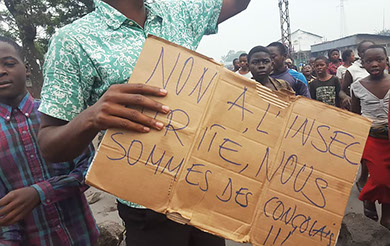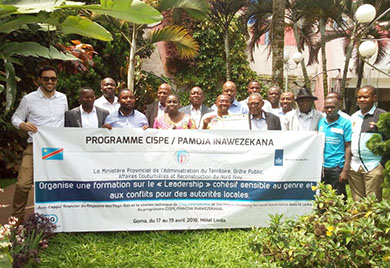

‘You have an innovative method that allows everyone to identify security threats and problems, share and harmonize with others, and find compromises on priorities. It's really a very good participatory method’.
Mr. Andibo Okaume Eugène, Chief of Walese Vonkutu, Irumu Territory
‘As a member of Parliament, it was necessary to participate in the training and understand the practical security diagnosis. It really was a capacity building activity that we all should get from the beginning of our mandate’.
Honorary Jeanine MABUNDA,
then vice-president for Provincial Assembly of North Kivu.
Dealing with Conflict, Fragility
and Migration by strengthening
local government
Featured Project
DRC, Consortium for the Integrated Stabilisation and Peace of Eastern DRC (CISPE)
For decades, the eastern Democratic Republic of Congo has been scarred by international conflict and domestic war, the breakdown of the state and widespread corruption. During the last few years, the further proliferation of armed groups in the East has been notable. And whilst the army and police were increasingly deployed in the different areas, these have committed atrocities against the population it purportedly served to protect. An already fragile relationship between the state and citizen because of a lack of any economic development was further hurt.
In 2015, a consortium of the International Organization for Migration (IOM), Cordaid, PAX and VNG International started the programme “Pamoja Inawezekana” (“Together It Is Possible”) for the provinces of North-Kivu and Ituri, aiming to improve local security, promote dialogue in support of peace and link these results to local development initiatives and the rebuilding of trust between communities and government actors at all levels.
Results include:
- A step-by-step rebuilding of trust between stakeholders can be noted in each of the seven selected territories of the programme. VNG International, together with local government administrators, provincial administrators and customary authorities have worked to improve the joint analysis, planning and decision-making processes with regard to security dynamics.
- Based on the positive experiences of ‘Local Participatory Security Planning (LPSP)’, the programme supported local actors to identify how the provincial and national governments could contribute to their efforts. In North Kivu, the Provincial Assembly has amended the budget of the Provincial Interior Ministry, to reflect the needs identified for the LPSP process.
- Under the leadership of the provincial administrations, the LPSP was presented to the national government in Kinshasa. Since the end of 2018, it has served as an inspiration for the development of similar plans in other parts of the country. Mainstreaming this approach into Congolese policymaking, including in this process the Prime Minister’s office, the Interior Ministry, the Land Management Ministry amongst others, contributes to the durability of the principles and the LPSP approach as such.
- In the area where the programme is still active, the appreciation and the ownership of the process by the participants are growing. For the territories, it has been encouraging that the provincial and national authorities have repeatedly expressed their support.
The continued guidance, training and support by a dedicated team of experts in Congolese local governance, has built significant confidence and credit with the members of the local administration, customary authority, civil society and selected members from the security services.
The programme was developed in line with the International Stabilisation and Security Support Strategy (ISSSS) and implemented in coordination with the Congolese stabilisation programme STAREC.